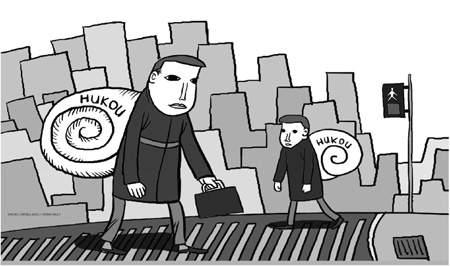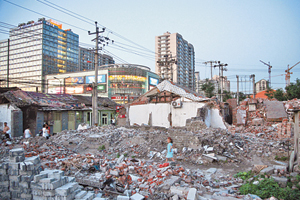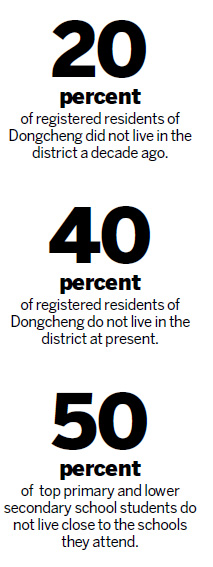 |
Large Medium Small |

Many live in one part of city but official papers list them as living elsewhere
A decade ago, when Zhao Dan was still a high school student, she moved with her family from an old courtyard in Chongwen district to an apartment in Chaoyang district.
The old courtyard where she had lived was demolished last year but on her identity card and hukou (permanent residence registration) booklet, she is still marked as being a resident of Chongwen district, the place she has not lived in for 10 years.
Zhao's case is not unusual in the city. After decades of demolitions, relocations and migration at an ever increasing speed and scale, many Beijing dwellers have left their old houses in the downtown areas and moved to new apartments in the surrounding districts or even the suburbs.
But not everyone who has moved has changed his or her hukou, leading to the separation between registered and real residences.
Streets that no longer exist and houses that have been demolished live on in the hukou booklets of many residents.
The phenomenon is most widespread in the districts at the heart of the city. Dongcheng and Xicheng district offices of the Sixth National Population Census recently announced they had seen a considerable surge of separation between registered and real residences.
A decade ago, about 20 percent of registered residents of Dongcheng did not live in the district. Now the proportion has doubled. The number in Xicheng district is even larger.
|
 Old courtyard and communities in Beijing have been under almost constant demolition and urban redevelopment. |
In Chongwen and Xuanwu districts, which are soon to be merged into new Dongcheng and Xicheng districts respectively, the situation is similar.
Tian, an official of the Xuanwu district office of the Sixth National Population Census, told METRO the discrepancy between registered and real residences is also very common in Xuanwu.
Another official of the Xuanwu office told METRO the situation is usually the result of demolitions and relocation projects. Many residents who have been squeezed out of Xuanwu have simply retained their old hukou.
Wang Hui, a resident of Chaoyang district, told METRO many of his neighbors, friends and colleagues no longer live in the places recorded on their hukou.
Wang, one of his colleagues, once lived close to Xuanwumen. Last year, when his old house was demolished, he was relocated to Daxing district. His hukou, however, remained in Xuanwu district.
One of the reasons why residents hang on to their old addresses on their hukou is so that their children can be enrolled in better schools because primary and lower secondary schools in the city mostly enroll only those children whose hukou are close to the school.
 Many good schools are located in the central area and a lot of parents hang on to old hukou just to get their children into those schools, said an official with the Xicheng district office of the Sixth National Population Census.
Many good schools are located in the central area and a lot of parents hang on to old hukou just to get their children into those schools, said an official with the Xicheng district office of the Sixth National Population Census.
Among students enrolled at top primary and lower secondary schools in the city center, many do not live close to the schools, the official said. The proportion can be as high as 50 percent in some schools.
An employee in charge of student enrolment at one top city school said he was aware of many such cases. In one instance, two brothers as well as their parents, wives and children were all registered as living in a flat that only comprised 11.3 square meters. Clearly, they did not live there and were using the address simply to gain access to better schools.
In other cases, householders at the address on the hukou had no idea who the child was who carried the hukou bearing that address.
"A student might have a hukou near the school, but his or her registered address could be a public lavatory," he said.
Census officials said there were other reasons why so many hukou documents carried old addresses.
Some residents changed their address but not their documentation after getting married or divorced.
Other times, family members did not cancel the hukou of a dead relative or employees who had lived at a collective hukou had moved to another employer.
Officials with the Dongcheng and Xicheng offices said the city will carry out a campaign to rectify the discrepancies between registered and real residences starting on Aug 15 when census workers, using data provided by the public security bureaus, will try to identify the residents whose hukou and real residences do not match.
They will contact residents and try to ensure hukou match the places people are really living.
Then, many streets and addresses that have disappeared in reality may disappear from residents' identity cards and hukou booklets, too.
China Daily